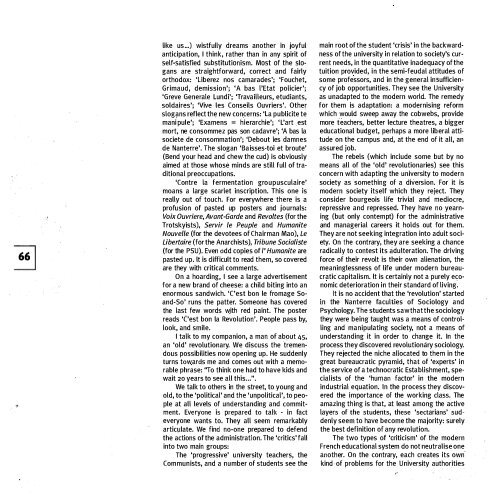SITUATIONISTS AND THE 1£CH MAY 1968
umMYFs
umMYFs
Create successful ePaper yourself
Turn your PDF publications into a flip-book with our unique Google optimized e-Paper software.
like us ...) wistfully dreams another in joyful<br />
anticipation, I think, rather than in any spirit of<br />
self-satisfied substitutionism. Most of the slo·<br />
gans are straightforward, correct and fairly<br />
orthodox: 'Liberez nos camarades'; 'Fouchet,<br />
Grimaud, demission'; 'A bas l'Etat policier';<br />
'Greve Generate Lundi'; 'Travailleurs, etudiants,<br />
soldaires'; 'Vive les Conseils Ouvriers'. Other<br />
slogans reflect the new concerns: 'La publicite te<br />
manfpule'; 'Examens = hierarchie'; 'L'art .est<br />
mort, ne consommez pas son cadavre'; 'A bas la<br />
societe de consommation'; 'Debout les damnes<br />
de Nanterre'. The slogan 'Baisses·toi et broute'<br />
(Bend your head and chew the cud) is obviously<br />
aimed at those whose minds are still full of tra·<br />
ditional preoccupations.<br />
'Contre la fermentation groupusculaire'<br />
moans a large scarlet inscription. This one is<br />
really out of touch. For everywhere there is a<br />
profusion of pasted up posters and journals:<br />
Voix Ouvriere, Avant·Garde and Revoltes (for the<br />
Trotskyists), Servir le Peuple and Humanite<br />
Nouvel/e (for the devotees of Chairman Mao), Le<br />
Libertaire (for the Anarchists), Tribune Socialiste<br />
(for the PSU). Even odd copies of/' Humanite are<br />
pasted up. lt is difficult to read them, so covered<br />
are they with critical comments.<br />
On a hoarding, I see a large advertisement<br />
for a new brand of cheese: a child biting into an<br />
enormous sandwich. 'C'est bon le fromage So·<br />
and·So' runs the patter. Someone has covered<br />
the last few words with red paint. The poster<br />
reads 'C'est bon la Revolution'. People pass by,<br />
look, and smile.<br />
I talk to my companion, a man of about 45,<br />
an 'old' revolutionary. We discuss the tremen·<br />
dous possibilities now opening up. He suddenly<br />
turns towards me and comes out with a memo·<br />
rable phrase: "To think one had to have kids and<br />
wait 20 years to see all this ...".<br />
We talk to others in the street, to young and<br />
old, to the 'political' and the 'unpolitical', to peo·<br />
ple at all levels of understanding and commit·<br />
ment. Everyone is prepared to talk · in fact<br />
everyone wants to. They all seem remarkably<br />
articulate. We find no·one prepared to defend<br />
the actions of the administration. The 'critics' fall<br />
into two main groups:<br />
The 'progressive' university teachers, the<br />
Communists, and a number of students see the<br />
main root of the student 'crisis' in the backward·<br />
ness of the university in relation to society's cur·<br />
rent needs, in the quantitative inadequacy of the<br />
tuition provided, in the semi-feudal attitudes of<br />
some professors, and in the general insufficien·<br />
cy of job opportunities. They see the University<br />
as unadapted to the modern world. The remedy<br />
for them is adaptation: a modernising reform<br />
which would sweep away the cobwebs, provide<br />
more teachers, better lecture theatres, a bigger<br />
educational budget, perhaps a more liberal atti·<br />
tude on the campus and, at the end of it all, an<br />
assured job.<br />
The rebels (which include some but by no<br />
means all of the 'old' revolutionaries) see this<br />
concern with adapting the university to modern<br />
society as something of a diversion. For it is<br />
modern society itself which they reject. They<br />
consider bourgeois life trivial and mediocre,<br />
repressive and repressed. They have no yearn·<br />
ing (but only contempt) for the administrative<br />
and managerial careers it holds out for them.<br />
They are not seeking integration into adult soci·<br />
ety. On the contrary, they are seeking a chance<br />
radically to contest its adulteration. The driving<br />
force of their revolt is their own alienation, the<br />
meaninglessness of life under modern bureau·<br />
cratic capitalism. lt is certainly not a purely eco·<br />
nomic deterioration in their standard of living.<br />
lt is no accident that the 'revolution' started<br />
i.n the Nanterre faculties of Sociology and<br />
Psychology. The students saw that the sociology<br />
they were being taught was a means of control·<br />
ling and manipulating society, not a means of<br />
understanding it in order to change it. In the<br />
process they discovered revolutionary sociology.<br />
They rejected the niche allocated to them in the<br />
great bureaucratic pyramid, that of 'experts' in<br />
the service of a technocratic Establishment, spe·<br />
cialists of the 'human factor' in the modern<br />
industrial equation. In the process they discov·<br />
ered the importance of the working class. The<br />
amazing thing is that, at least among the active<br />
layers of the students, these 'sectarians' sud·<br />
denly seem to have become the majority: surely<br />
the best definition of any revolution.<br />
The two types of 'criticism' of the modern<br />
French educational system do not neutralise one<br />
another. On the contrary, each creates its own<br />
kind of problems for the University authorities










